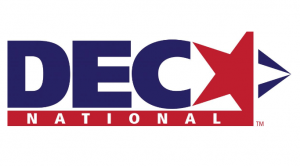 The California Chamber of Commerce recently joined nearly 125 trade specialists from across the nation for sessions focused on trade issues at the National District Export Council’s Annual Export Symposium in Washington, D.C.
The California Chamber of Commerce recently joined nearly 125 trade specialists from across the nation for sessions focused on trade issues at the National District Export Council’s Annual Export Symposium in Washington, D.C.
Susanne T. Stirling, CalChamber vice president of international affairs, was among participants at the September 27 Annual Trade Symposium, held and presented by the U.S. Chamber of Commerce together with the National District Export Council (DEC). Stirling serves on the Northern California DEC, the steering committee of the National DEC, and the International Policy Committee of the U.S. Chamber of Commerce.
The symposium was opened by Robert Brown, chair of the National DEC, and Christopher Wenk, executive director, international policy for the U.S. Chamber. Brown had been re-elected as National DEC Chair for 2017–18 the day before the symposium.
Following are highlights from the export symposium. For more details, visit www.calchamber.com/international.
NAFTA Support
Wenk opened by reiterating U.S. Chamber support for the North American Free Trade Agreement (NAFTA), and stating that the first priority during the negotiations is “to do no harm.”
The U.S. Chamber and the CalChamber support modernizing NAFTA and doing so in a timely fashion. The presidential election in Mexico and the U.S. mid-term elections loom large over the timing of the negotiations.
Wenk went on to indicate U.S. Chamber support for the U.S.-Korea Free Trade Agreement. In particular it makes sense to focus on the full implementation of the agreement, rather than withdrawing as recently was hinted by the Trump administration.
Export-Import Bank
Lastly, Wenk mentioned the need for a quorum at the Export-Import Bank. Wenk went on to explain that the U.S. Chamber had just earlier in the week indicated it does not support Senate confirmation of the President-appointed Chair, as he has not shown himself to be a supporter of the Ex-Im Bank functions.
However, the U.S. Chamber is supportive of having a full quorum to be able to move the Ex-Im Bank operations forward. In the interim, deals are limited to $10 million.
Representative Andy Barr (KY, R-6th), who serves on the Financial Services Committee, said his committee is interested in furthering the diversity of the portfolio of the Ex-Im Bank, as it is highly concentrated in certain industries and geographical areas.
The bank supports 2% of exports, so there needs to be more focus on opening foreign markets for U.S. business in general.
Export Controls
Following a session on export controls with representatives of the U.S. Commerce and Treasury departments, company representatives gave a private sector perspective on the impact of the export control programs — and finding a balance between cost and compliance.
Panelists for this session included CalChamber member Roy Paulson, president, Paulson Manufacturing Corporation and former National DEC Chair, and Laura Molinari, executive counsel, international trade compliance, GE.
The companies expressed an interest in making sure that their customers also were in compliance and well-documented in their compliance efforts. The panel was led by former National DEC Chair Dan Ogden.
National DEC Forum
 Welcoming about 60 members to the Thursday, September 28 National DEC Forum was Tom McGinty, acting assistant secretary for the U.S. Commerce Department. Attending the forum from California were members of the NorCal DEC, the San Diego DEC, and the Inland Empire DEC. Earlier this year, McGinty joined the May 2017 California DEC meeting held at the CalChamber.
Welcoming about 60 members to the Thursday, September 28 National DEC Forum was Tom McGinty, acting assistant secretary for the U.S. Commerce Department. Attending the forum from California were members of the NorCal DEC, the San Diego DEC, and the Inland Empire DEC. Earlier this year, McGinty joined the May 2017 California DEC meeting held at the CalChamber.
McGinty stated that of every $1 spent by the U.S. Department of Commerce, there is $192 of wealth generated. In the client base the International Trade Administration serves, customers’ satisfaction rate is 78%.
In addition, McGinty spoke of the success of the “Discover Global Markets” series of 16 events nationwide. Regarding the ITA budget, McGinty is optimistic about maintaining the current funding, which in these times is positive. The program then went on to recognize exemplary DECs, including the Inland Empire DEC from California.
Speakers at a session on international preparedness pointed to seemingly increasing disruption in the supply chain due to natural disasters and other issues. The speakers encouraged communication and coordination, in order to be better prepared for an emergency.
Also noted was that the Federal Emergency Management Agency (FEMA) has a business center, where information is distributed about any current situation. The Small Business Administration (SBA) also can provide disaster recovery for small businesses.

